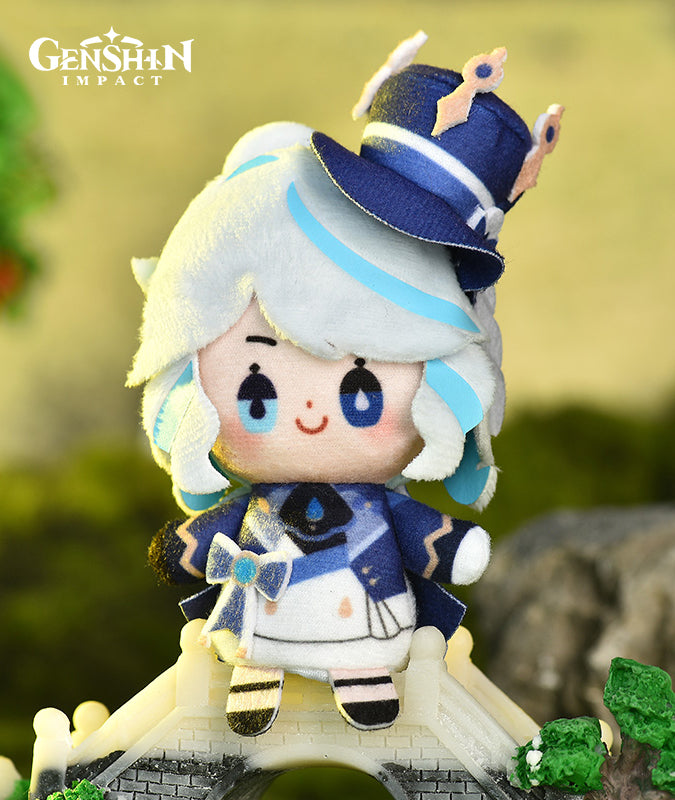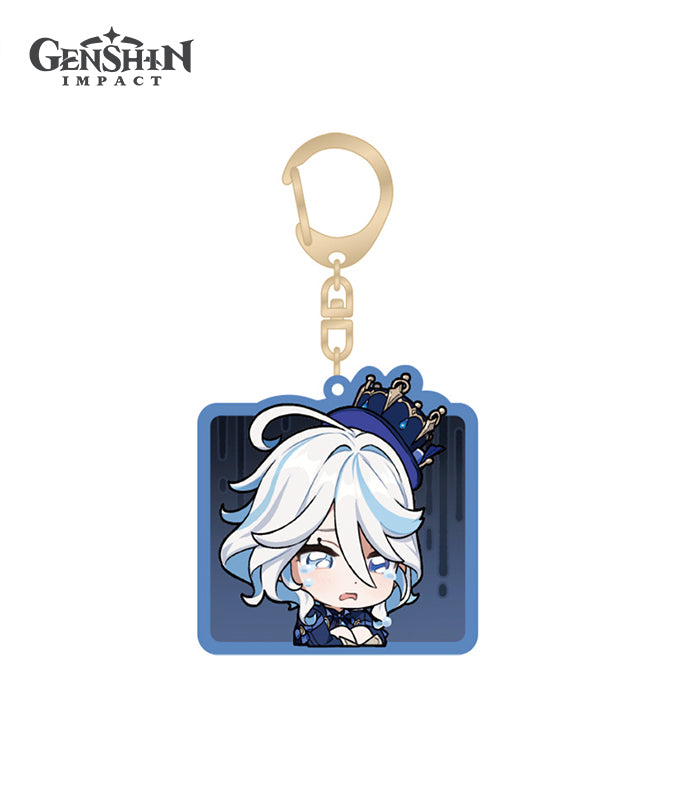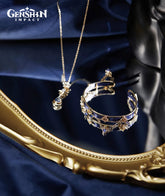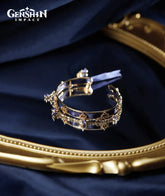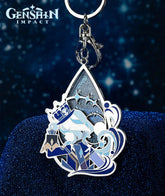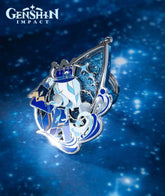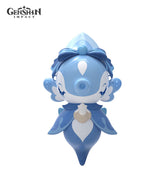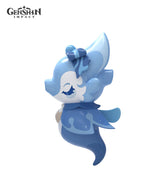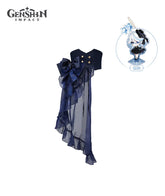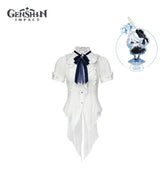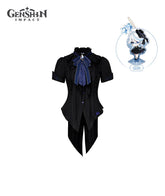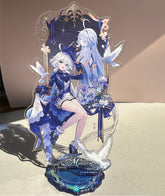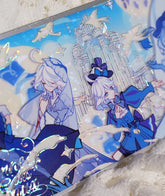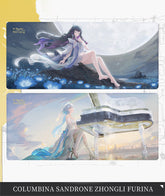Something You Don't Know about Furina
Today we are going to talk about Furina, on whom the production team of Genshin Impact put a lot of effort, and referenced many artistic works. Let's take a look together!
Furina
The Latin form of Furina is "Furies", the female chthonic goddess of vengeance in ancient Greek religion and mythology, and she would curse and punish wrongdoers. According to Hesiod, she was one of the daughters of Gaea (Earth), and sprang from the blood of her mutilated spouse Uranus. She lived in the underworld and ascended to earth to pursue the wicked.
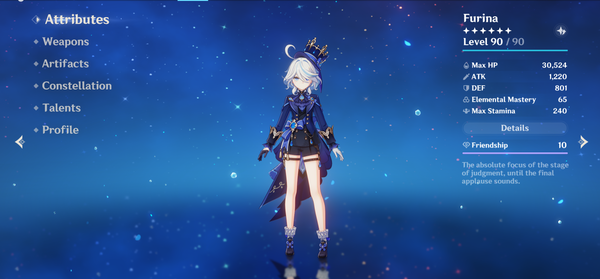
Furina's storyline is full of ups and downs, and it's deeply moving. While she may appear arrogant and flamboyant on the surface, she's actually strong, optimistic, and witty. Her unique personality and captivating story have attracted a large fanbase, making her incredibly popular. Furina is not only a major star in Fontaine but also a beloved idol to her fans. People eagerly follow Furina, buying all sorts of merchandise like plush, badges, keychains, Surintendante Chevalmarin bubble machine to show their love for her and bring more joy to their lives.
Focalors (Focalor)
Focalor is a Hellish Great Duke of Hell listed as 41st in the Ars Goetia. He commands thirty legions of demons and he appears as a man with griffon's wings. Focalor can kill and drown men, overthrow warships, and has power over wind and sea.
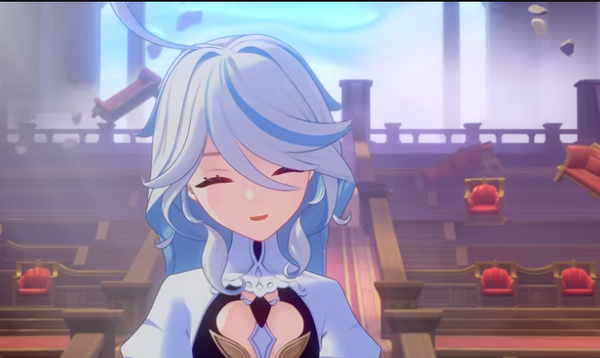
"The Forty-first Spirit is Focalor, or Forcalor, or Furcalor. He is a Mighty Duke and Strong. He appeareth in the Form of a Man with Gryphon's Wings. His office is to slay Men, and to drown them in the Waters, and to overthrow Ships of War, for he hath Power over both Winds and Seas; but he will not hurt any man or thing if he be commanded to the contrary by the Exocrist. He also hath hopes to return to the Seventh Throne after 1,000 years. He governeth 30 Legions of Spirits, and his Seal is this, etc."
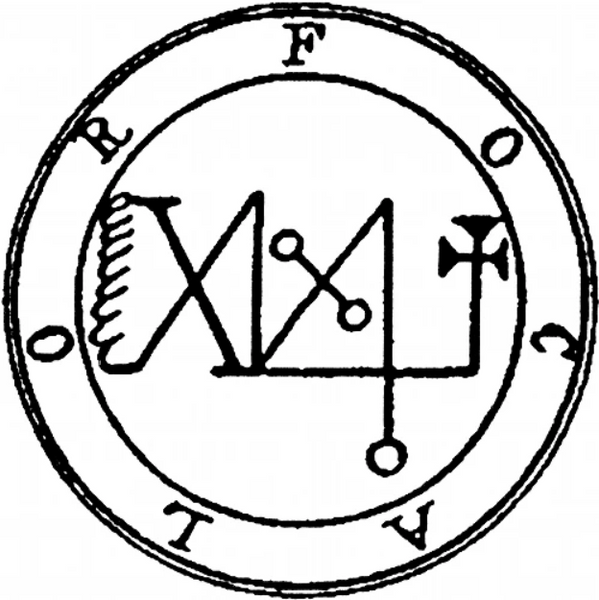
Normal Attack: Soloist's Solicitation
The term can be literally understoood as an invitation from a dancer who dances alone.
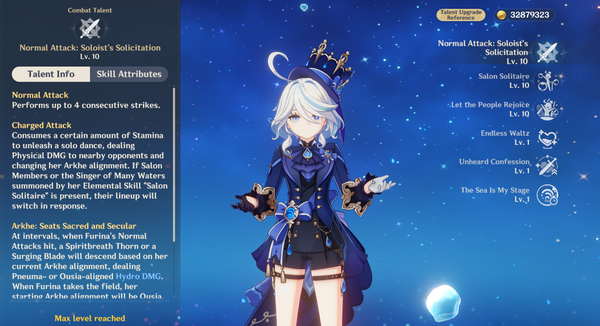
Salon Solitaire
"Solitaire" typically describes a card game played by one person, expressing a sense of loneliness.
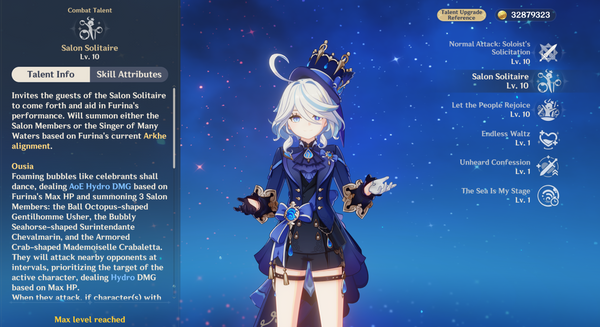
The word "salon" originally comes from the Italian word "salotto" and is a phonetic translation of the French "le salon". It originally referred to the luxxurious reception rooms in the homes of the French upper class. From the 17th century, celebrities in Paris often turned their living rooms into famous social venues. Frequent visitors included dramatists, novelists, poets, musicians, painters, critics, philosophers, and politicians. They gathered together, sipping beverages, enjoying elegant music, and having long conversations without restraint. This form of gathering was later called "a salon" and became popular in the cultural circles of Europe, reaching its peak in the 19th century.
Let the People Rejoice
This likely comes from the Bible (149:5-9):
"Let God's people rejoice in their triumph and sing joyfully all night long."
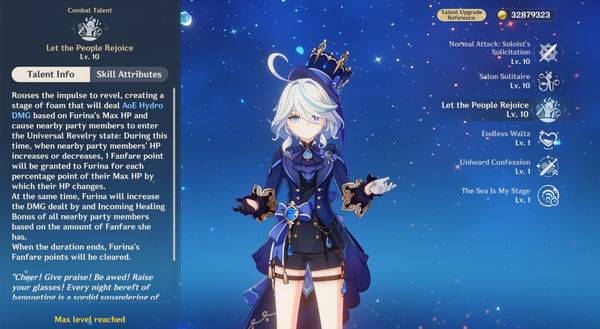
Endless Waltz
The Waltz is a form of self-entertainment dance. It is one of the earliest and most enduring forms of self-entertainment dance in ballroom dancing.
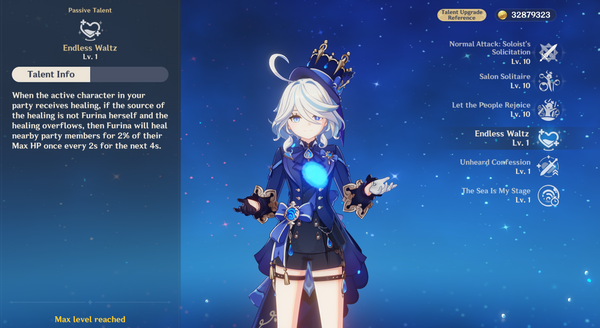
Interestingly, early waltz was despised by the nobility of various European countries, but after the French Revolution, the bourgeoisie immediately embraced the waltz. According to statistics, at the end of the 18th century, Paris alone saw the emergence of more than 700 dance halls.

Animula Choragi
"Animula" means "soul" in Latin. Here, let's focus on the term "choragi". "Choragi" comes from the Latin word "choregiai". In ancient Greek drama, it referred to an Athenian citizen who undertook public duties and was responsible for funding the preparation of the chorus and other aspects of drama production, becoming the leader of the entire drama team.
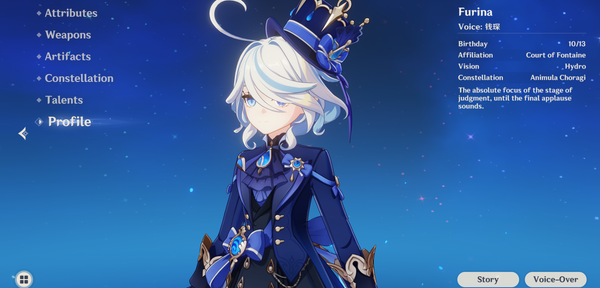
The Choragi was appointed by magistrates and Athenian tribes from wealthy Athenian citizens. Though it was an honor, it was also a part of the ritual system and the duty of wealthy citizens. The position aimed to enhance the city's artistry and influence by using private wealth to fund public affairs. The Choragi would pay for custumes, rehearsals, choirs, sets, props, special effects, and most musician's expenses. If the choir won the competition, he would also host a banquet.
Since the drama awards at the Athenian drama festival were jointly awarded by the playwrights and dancers, such victories brought prestige to the Choragi. Historically, several famous political figures have served as Choragi, including Themistocles, Pericles, and Plato. The Athenians would also build monuments to commemorate their victory.
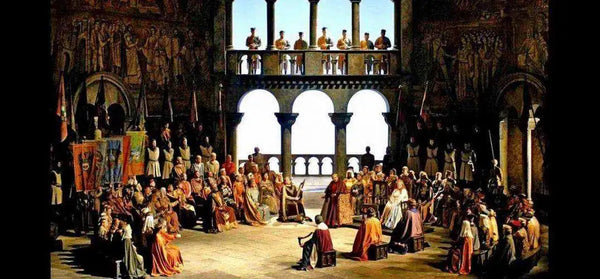
Furina Constellation Lv. 1
"Love is a Rebellious Bird That None Can Tame"
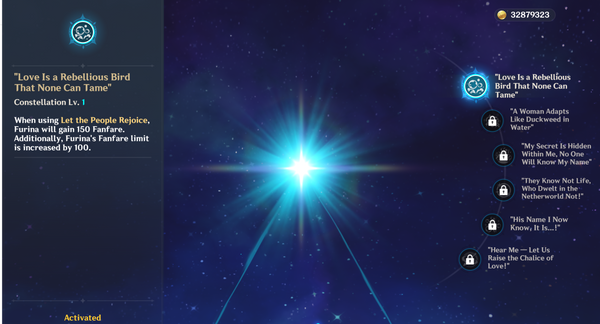
This name is taken from the opening aria of the mezzo-soprano protagonist in Act 1, Scene 5 of "Carmen":
"L'amour est un oiseau rebelle,
Que nul ne peut apprivoiser,
Et c'est bien en vain qu'on l'appelle,
S'il lui convient de refuser;
Rien n'y fait, menace ou prière,
L'un parle bien, l'autre se tait,
Et c'est l'autre que je préfère,
Il n'a rien dit, mais il me plaît."
The opera "Carmen" is based on a novel of the same name by Mérimée, and the French composer Bizet completed the opera. It is Bizet's last opera and is one of the most frequently performed operas in the world today.
The opera features characters such as female workers, soldiers from peasant backgrounds, and the masses, which was rare and valuable in opera works of that era. Perhaps due to the author's deliberate innovation, the initial performance of this opera was not well received by the audience. However, as time passed, the artistic value of this work gradually gained recognition, and it became enduringly popular. This opera is known for its choruses, with more than ten different choral forms and styles throughtout the piece.
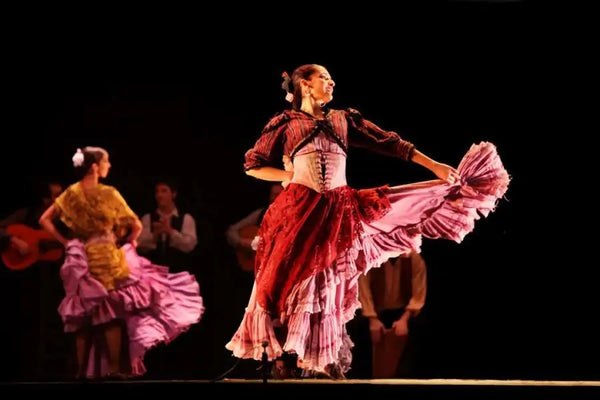
Furina Constellation Lv. 2
"A Woman Adapts Like Duckweed in Water"
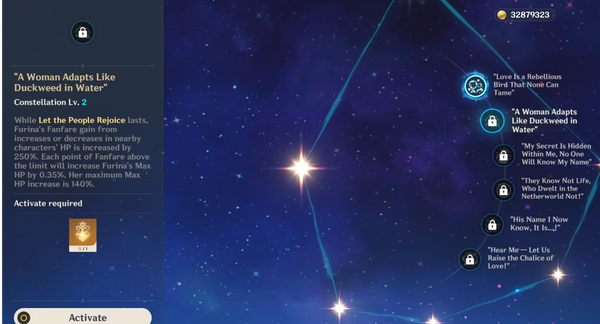
This name is taken from the most famous aria in the opera "Rigoletto":
"La donna è mobill
qual piuma al vento,
muta d'accento
e di pensier,"
"Rigoletto" is an opera in three acts by Italian composer Giuseppe Verdi. The libretto, written by Francesco Maria Piave, is based on Victor Hugo's play "Le roi s'amuse". The composer focused on enhancing the dramatic elements of the opera, using musical techniques to deeply express the characters' emotional changes and personalities.
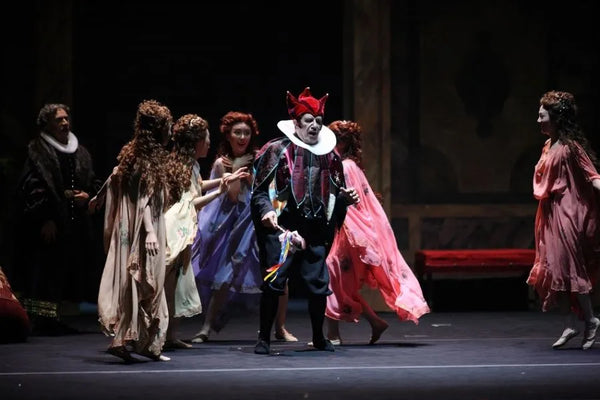
Furina Constellation Lv. 3
"My Secret is Hidden Within Me, No One Will Know My Name"

This name is taken from the most famous aria in the opera "Turandot":
"Ma il mio mistero è chiuso in me,
Il nome mio nessun saprà!
No, no, sulla tua bocca lo dirò,
Quando la luce splenderà!"
"Turandot" is an opera in three acts by Italian composer Giacomo Puccini, based on the fairy tale "Turandot's Three Riddles". It is one of Puccini's most influential works and his last opera. The opera tells a legendary story imagined by a Westerner about China.
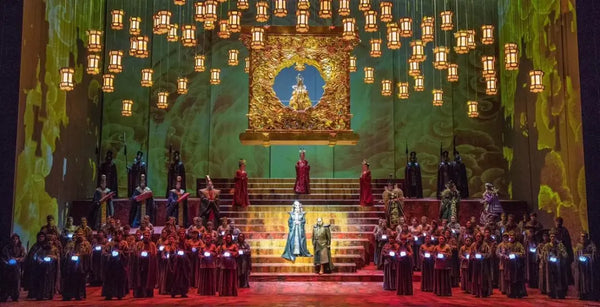
Furina Constellation Lv. 4
"They Know Not Life, Who Dwelt in the Netherworld Not!"
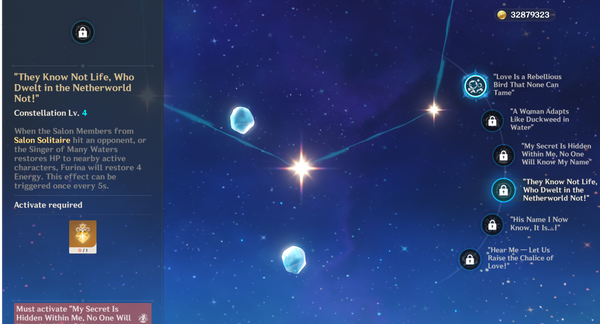
This name is taken from the chorus lyrics in Act 2, Scene 1 of the opera "Orpheus in the Underworld":
"Si l'on comprend la vie,
Amis, c'est en enfer!
Vive le vin! Vive Pluton!"
"Orpheus in the Underworld" is an opera composed by German-born French composer Jacques Offenbach in 1858. This opera is not only the most famous of all light operas but also the best of Offenbach's many light opera works. Additionally, the overture "Orpheus in the Underworld" was later used as the music for the sinking scene in the movie "Titanic".
Orpheus is a famous poet and singer in Greek mythology, whose singing could make beasts bow and rocks nod. When he went to the underworld to find his deceased wife, Eurydice, he sang all the way, moving the king and queen of the underworld, who agreed to let Eurydice return to the human world. However, Orpheus forgot the king's instructions and looked back at his wife near the surface, causing her to return to the underworld. Orpheus, in great sorrow, vowed never to marry again.
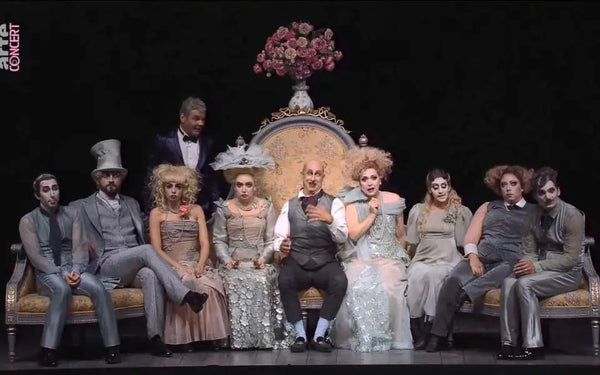
Furina Constellation Lv. 5
"His Name I Now Know, It Is...!"
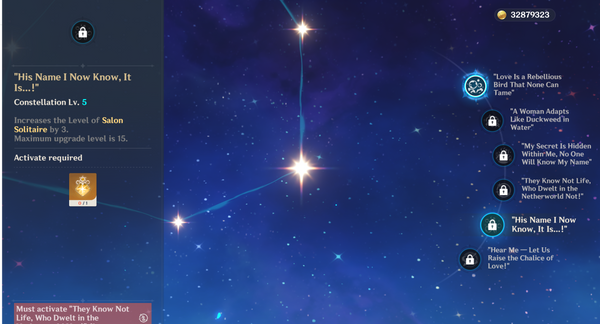
This name is taken from the line of Princess Turandot in Act 3, Scene 2 of the opera "Turandot":
"Padre augusto,
Conosco il nome dello straniero!
Il suo nome é amor!"
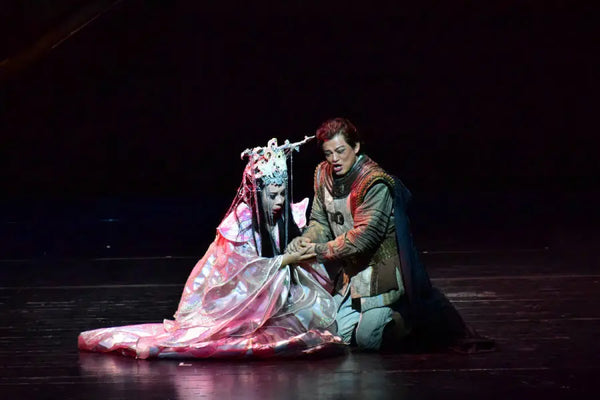
Furina Constellation Lv. 6
"Hear Me - Let Us Raise the Chalice of Love!"
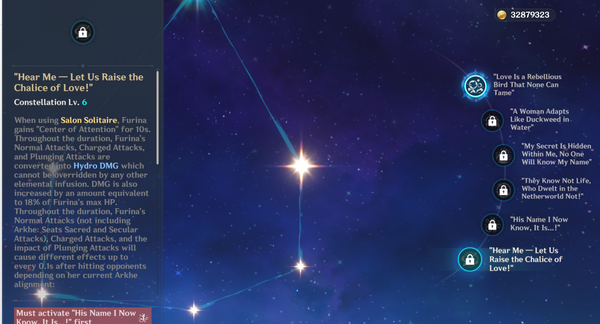
This name is taken from the aria "Brindisi" in the opera "La Traviata":
"Libiamo, libiamo ne' lieti calici,
che la bellezza infiora;
E la fuggevol, fuggevol ora,
s'inebriì a voluttà."
"La Traviata" is an opera by Italian composer Giuseppe Verdi, inspired by the play based on the novel of the same name by French writer Alexandre Dumas fils. After watching the play, Verdi was deeply moved and invited a playwright to revise the script, completing the opera in just six weeks.
"La Traviata" is the last of Verdi's popular trilogy and one of the most successful classic works in the history of world opera. The opera, in three acts, premiered at the La Fenice opera house in Venice and has since become one of the most beloved works in opera houses worldwide. The French author Alexandre Dumas fils once remarked, "Fifty years from now, perhaps no one will remember my novel 'La Traviata,' but Verdi has made it immortal." The opera tells the tragic love story of Parisian courtesan Violetta and young Alfredo. The music is beautiful and lyrical, filled with genuine emotion, with "Brindisi" being one of the most familiar operatic pieces.
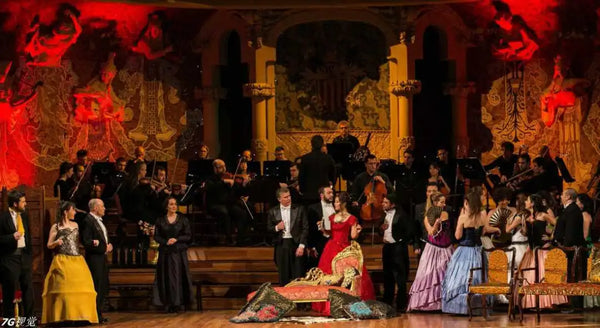
Furina's design references a lot of elements from operas, which is very fitting for her character. These operas are classic artistic works worth exploring.
















